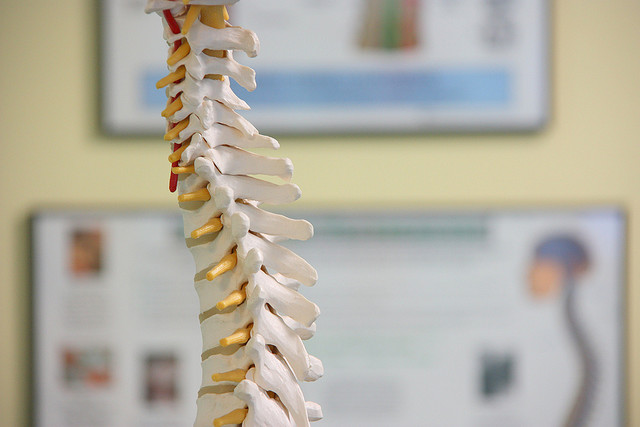In the April-May 2015 issue, LiveLiving magazine featured an article—“Finding Health and Balance through Harmonious Eating”—in which I addressed the importance of eating harmoniously. The article specifically highlighted how stress, incorrect eating, and a hurried lifestyle can negatively impact the mind, body, and spirit.
Today, stress is the rule and not the exception. And, although everyone experiences stress, it’s the chronic prolonged stress that produces mechanical and biochemistry disturbances in the body. As a matter of fact, current estimates suggest that a whopping 70 and 80 percent of all doctor visits are for stress- related disorders. The American Chiropractic Association (ACA) also reports that 31 million people will experience back pain at any given time. I find it also important to mention that the majority of those complaints are mechanical in nature, and not disease-related.
Again, it is all interrelated
The musculoskeletal system is comprised of the bones, joints, muscles, and connective tissue. When misalignments occur, they are usually related to prolonged stress, poor posture, poorly fitting shoes, or a traumatic injury. Of course internal issues can also cause misalignments to occur, but for the purposes of this article, I want to address how poor posture and a wide range of health problems are interrelated.
The body systems of the human are designed to work harmoniously. For instance, the nervous system (comprised of the central nervous system (CNS), the autonomic nervous system (ANS) and the peripheral nervous system (PNS)) controls and regulates all the other body systems. Health and healing rely on these three systems working harmoniously without disrupted nerve flow to the organs, muscles, and other body systems.
Most of us will experience stress many times over. Stress usually settles in the muscles of the face, skull, upper shoulder, head, neck, and back. Prolonged stress and tension can cause chronic muscular contractions that will eventually create musculoskeletal imbalances. These muscular contractions, especially of the head and neck, can also interfere with blood flow to the brain resulting in a decrease in oxygen. The brain demands a great deal of blood. In fact, 30 percent of the brain’s blood supply comes through the vertebral artery that starts at the base of the neck. So when the blood flow is restricted because of misalignment of the neck due to poor posture or an injury, the brain will suffer—oxygen drops and carbon dioxide rises. A tension headache is a great example of decreased oxygen and blood flow in the brain.
Poor posture
So how does poor posture fit into the health equation? Well, here we go. Americans are known stress carriers and workaholics. Our lifestyles are more conducive to illness than to health and balance. We are a society that finds it hard to stop and smell the roses, or even stop to eat. That’s right, making time to relax and eat is very hard to do these days. Most people eat at their desk while working, or in route to other appointments.
Unfortunately, I know this lifestyle too well. Yes, I was one of those workaholics who ate at my desk while working on three to four legal transactions simultaneously. This self-inflicted abuse went on for more than 10 years. And, as a result, I experienced various health issues that were stress- and musculoskeletal-related. I spent more than 9 hours hunched over my desk and wearing shoes that placed undue pressure on my spinal column. The muscles over my shoulder blades and chest ached constantly. I even developed a frozen shoulder because my pectoris muscles were so tight and tense. I was so fatigued and tensed that my shoulders rolled forward. All these musculoskeletal imbalances put so much pressure and strain on various muscles and cranial bones that I even felt tension in my head. My scalp was so tight at times that I really thought I would lose my hair if I didn’t get help! It was crazy. I am sure I had decreased blood flow and oxygen to my brain because I suffered from tension headaches weekly.
But the biggest and the most persistent problem those 10 stressful years granted me was poor digestive health. That’s right, poor digestion and poor posture are closely related! This is how it works. When you eat poorly by consuming processed and denatured foods, you have a decrease in digestive function. This decrease results in a big drop in energy, making it hard to keep good posture. And, once you start on the low-energy track, it’s hard to stop that train.
This is what that runaway train looks like: To boost our energy, we live off stimulants such as coffee, cigarettes, and high-sugar foods. The chemical stimulants in coffee, tea, and cigarettes stimulate the release of adrenaline. You also run the risk of disturbing your thyroid balance (slow metabolism and weight gain) and calcium balance (arthritis). The more you depend on stimulants for energy, the more your blood sugar fluctuates. The “rebound” is low blood sugar, which triggers the release of adrenal hormones. Highs and lows in adrenaline make your body think it’s experiencing a “fight or flight” episode when, in actuality, dips in blood sugar are the real problem.
Excessive cortisol is another side effect of prolonged stress and the release of adrenal hormones. According to research by Robert Sapolsky, Professor of Neuroscience at Stanford University in California, after two weeks of raised cortisol levels, the dendrite “arms” of brain cells that reach out to connect with other brain cells start to shrivel up. Stop the stress and the dendrites grow back. Who would have guessed that your biochemistry could be so adversely affected by stress?
Conclusion
Healing is spiritual and requires your active participation. Research has shown that reoccurrence of heart attacks and strokes can be linked to emotions. Medical researchers in Montréal tracked 222 post-heart attack victims. They found that those victims who were depressed, sad, and hopeless were ten times more likely to die of another heart attack within eighteen months of their first occurrence than the victims who were not depressed, sad, or hopeless. The researchers also conducted a ten-year study to follow the mortality rates of people who had a stroke. Those who were diagnosed with depression were more than three times likely to have died within the follow-up period.
Additionally, studies in the field of psychoneuroimmunology (PNI) show a definite connection between emotions and immune function responses. Candace Pert, PhD, is a former research professor and a respected authority in the field of PNI. She says this about her research in PNI: “It took us 15 years of research before we dared that connection. . . . but we know that these neuropeptides are released during different emotional states.” Emotions, previously thought to be purely psychological, can now be linked to specific chemical processes (endorphins and neuropeptides) taking place throughout the body including the brain, the immune system, and the endocrine system.
You are what you think, say, and do! If you want to be well, then you must take an active role in creating a safe and healthy environment in which to abide. Find balance, eat harmoniously; and by all means check your posture and make the necessary adjustments. Everyone knows that when you feel bad or tired, your posture will change to reflect your pain.
I remember my mother telling me as a young adult that if I walked tall no one would notice that I wasn’t tall. There was certainly some truth to that because very few people believed that I was only five feet three inches tall! Thanks to my mother, I presented myself much taller even on those days when things were not quite right. Thanks, Mom for that valuable nugget because it still holds true today!
References
Holford, Patrick. The New Optimum Nutrition Bible. Berkeley CA: Crossing Press, 2005.
ACAtoday.org “Back Pain Facts and Statistics.”
Trivieri Jr., Larry and John W. Anderson, editors. Alternative Medicine – The Definitive Guide. Second Edition. Eagan MN: InnoVision Health Media, Inc., 2002.
Candace B. Pert. Molecules of Emotion: The Science behind Mind-Body Medicine. First Touchstone Edition 1999. Foreword Copyright 1997 by Deepak Chopra MD. Cambridge, UK: Cambridge University Press, 1997.
Frasure-Smith, N., F. Lesperance, M. Taljic. “Depression and 18th Month Prognosis after Myocardial Infraction.” Circulation 91 (1995); 99-1005
Morris, P.L., R.G. Robinson, P. Andrzejewski, et al. “Association of Depression with 10-Year Post-stroke Mortality.” Am J Psychiatry 150 (1993); 124-129.




